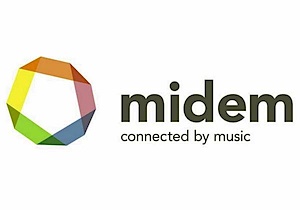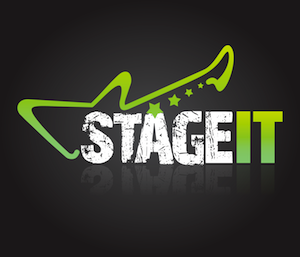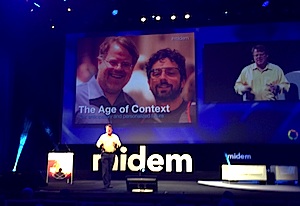
MIDEM (1/28/13)
“Artist Leveraging Tech & Brands”
 “Vision Monday” is a feature of MIDEM where panels and leaders address and discuss major issues in the music industry. There were a number of empty seats in the auditorium when the sessions began although, to be fair, it is a large auditorium.
“Vision Monday” is a feature of MIDEM where panels and leaders address and discuss major issues in the music industry. There were a number of empty seats in the auditorium when the sessions began although, to be fair, it is a large auditorium.
The morning session for “Vision Monday” began with a panel, “Artists Leveraging Tech & Brands,” hosted by Ralph Simon and featuring Nashville-based Marcie Allen with Mac Presents. Other panelists were Lori Feldman (Warner Brothers Records), rapper-producer Theophilus London and Jyrki Rosenberg (Nokia).
Simon began the session by asking how many “screen-agers” were in the audience. A “screen-ager” is someone who watches TV, the mobile phone and the laptop or notebook at the same time. This is a trend in media savvy types, who tweet, text, Facebook and browse on their computer while watching a TV show.
To start the session, Allen was asked if traditional sponsorships were a thing of the past and she replied with an emphatic “yes.” “Brands want to be fully integrated with an artist now,” she said. “It is a partnership and the artist must make that partnership authentic.”
The term “authentic” was bandied about quite a bit and Feldman gave the example of the partnership between Green Day and Nokia which launched Green Day’s album and Nokia phones in the United States. Although “authentic” can be interpreted a number of ways, the connection between an act and a brand can’t be just about the money. If the artist just wants money, according to the panelists, working with a brand won’t work because the brand and artist must be integrated to succeed.
London discussed his involvement with Bush Mills Whiskey and Bing, as well as a shoe company where he designed a shoe. The brands were involved in his career so it was a partnership that helped him promote his music while, at the same time, added a “cool” factor to the brand. Simon called it “cool hunting” when people are always on the lookout for what’s in and what isn’t in a never ending search to capture the “it factor” in their social lives.
Discussing the risks for brands and bands, Allen pointed out that “it is sex, drugs and rock’n’roll” and that artists do get into the news for unsavory behavior. “The most important thing is to do your research,” said Allen. “The brand needs to research the artist and the artist needs to research the brand. You need to know the people you’re working with.” Panelists also cautioned that the wrong brand connection could hurt an artist by turning off fans.
Rosenberg added that “you’re working with people so relationships are important.”
Simon asked if the “multi-million dollar deal” was over and Allen replied that “deals are different and must be defined in terms of things other than money. Does the artist receive cash or exposure?” she asked. “Are there media buys and promotions? Is the artist committed to do shows for the brand? All of these may be part of the deal and have monetary value. However, few brands spend big bucks on artist support.”
“It’s like a Chinese menu,” continued Allen. “You have to let the brand know what can be done and what that costs and you have to let the artist know what the brand can provide.”
Feldman added, “There needs to be true common ground between the artist and the brand for it to succeed.”
When asked about Taylor Swift endorsing Diet Coke, Allen replied that she thought it was a good fit for Taylor because she is known to support Diet Coke but cautioned that a brand needs to target the right demographic.
Feldman noted that she works a great deal with sports because “music is in all the arenas and stadiums, artists go to games, they perform at games and there’s always a connection between sports and music.”
Allen added that “a lot of artists have created video games” and cited the example of Linkin Park and Formula One Racing.
“Music In The Age of Content”
“Vision Monday” also offers “insights” from cutting edge figures as well as major leaders. Robert Scoble (Rackspace Hosting) presented “Music in the Age of Context.”
Scoble noted that “context is wearable computers” and gave the example of Google Goggles. This, he claimed, is a major trend, allowing brands and services to keep track of you and provide suggestions for future goods and services based on previous habits and purchases.
“Wearable computers” will affect health care because individuals can wear devices that monitor heart rate, blood pressure and other key factors that pertain to health. These readings can be relayed back to a place where this data is monitored.
Big Date and data computation is another trend where sensors send data about you to a site, where it is analyzed. Social network data is doubling, enabling companies to compile profiles of consumers. Location data adds to the fact that individuals will enter a highly personalized world that anticipates future buying and living patterns in order to suggest services and products.
From a company’s perspective, this allows “knowing your customer in deep detail” to “provide a personalized experience based on where you are.” This “context” will help individuals do more faster and “will affect every product and service.”
Scoble noted that this is “a new kind of marketing so prepare now,” asking the audience “Is your social media use advanced? Are you spending on making the customer experience better? And are you scared or excited by wearable computers and tracking.”
In answer to the last question, Scoble told the audience that if they were scared, “Get over it and lead or your computer will.”
Midem Lab
The winners of the midemlab contests were announced and demonstrated their products. In the “Music Discovery” category, Songful by instruMagic (Eyal Eldar, Co-Founder & CEO) features pre-loaded songs into a notebook so you can “strum” the notebook to play the chords of a song.
In the “Marketing and Social Engagement” category the award went to “Jamplify,” which allows an artist to reward fans who spread the word about him/her/them and their music.
 The “Direct to Consumer Sales and Content” category was won by “Stageit,” which features artists, in their down time, performing in front of their laptop for fans who put money into a “tip jar” so the artist has a revenue stream from playing a song in an intimate setting.
The “Direct to Consumer Sales and Content” category was won by “Stageit,” which features artists, in their down time, performing in front of their laptop for fans who put money into a “tip jar” so the artist has a revenue stream from playing a song in an intimate setting.
The “Coup de Coer Award” went to Audience.FM developed by Jules Terrien.
The final “Insight” of the morning came from Marcus Taylor who stated that a “roadmap” is needed to navigate music marketing. “Artists are so overwhelmed with so many services offered that they are overwhelmed,” said Taylor. “There’s an oversupply of services but no way to tell which ones are effective,” which leads most artists (78 percent) to outsource their music marketing because they can’t sort through the maze.”
Taylor did not provide a solution to evaluating music marketing offers but concluded “let’s build a roadmap.”
MIDEM (1/29/13)
The final day of MIDEM 2013 began on January 29 with a series of seminars to kick off the day.
A conversation with Willard Ahdritz, founder and CEO of Kobalt, was conducted with interviewer Bill Werde with Billboard. The provocative Ahdritz asserted that, because of inefficiencies of major publishers, “about 10 percent of income is stuck in the system,” and that his organization has been able to find many of these dollars.
Ahdritz said his organization “stresses transparency,” a theme that has been woven throughout this event. In the past, according to Ahdritz, songwriters and publishers simply said, “Show me the money” but now it is “Show me where the money is.” This is to answer the criticism generated especially toward agreements with streaming services, that the rates are a mystery and so are the charges, costs and exactly what songwriters and publishers are being paid for. Under Kobalt, “we show publishers and writers “this is the cost and this is the income,” said Ahdritz. “The internet will drive transparency. This will change the business because a great infrastructure leads to greater profits for everyone.”
Kobalt has been criticized by some major publishing giants who say the company cannot operate at a profit and keep promises it has made to songwriters and publishers. Ahdritz answered that charge, saying “If I ran Kobalt with their structure, it would not work.”
Ahdritz stated “there are 300 to 350 million active buyers of music. Our target is 100% growth in two years so in 2015 we will see 700 million active buyers. That’s what we are working towards—monetizing 1.5 billion people.”
“Entrepreneurship–Creative Innovation and Change Management in the Music Business”
Concluding seminars at MIDEM 2013 included one on “Entrepreneurship—Creative Innovation and Change Management in the Music Business” where presenter Axel Quack advocated “hacking” a company to solve inefficiencies. Quack said that “hacking” should have a positive connotation and can involve “soft hacking,” where “a person simply does not follow a stupid rule” and “hard hacking” where an employee gathers other employees to discuss problems in a company and then puts these to upper management in a united front.
The seminar “Marketing—Discovering, Developing, and Breaking New Talent” was presented by Wladimir Pandolfo, A&R with Warner Music (France).
Pandolfo stated that, in signing talent a label must (1) find the right 2.0 artist and (2) convince the artist that “strategy is not the enemy of art” and that there should be “no taboo with marketing.” Finally, a label or manager should “work for your artist, not against other artists.” This means “don’t be a copycat—look for what’s missing.”
Pandolfo said he looks for artist with something to say and that if an artist wants to present a broad range of styles he asks “Are you an artist or an iPod?”
He concluded with “Do it with passion or don’t do it at all.”

About the Author
Don Cusic is Professor of Music Business at Belmont University. He has authored 18 books, including his most recent “Discovering Country Music.”View Author Profile



